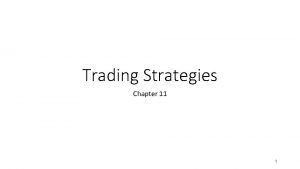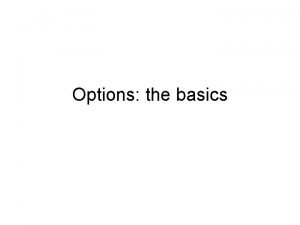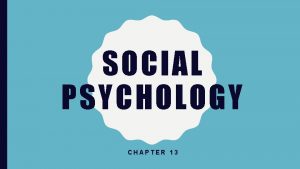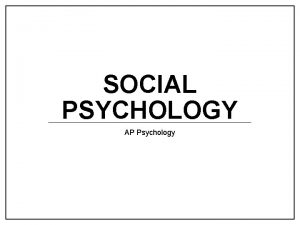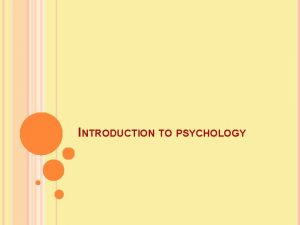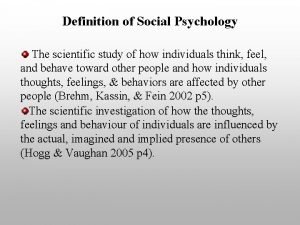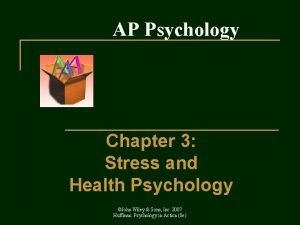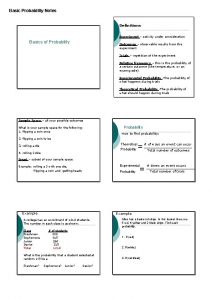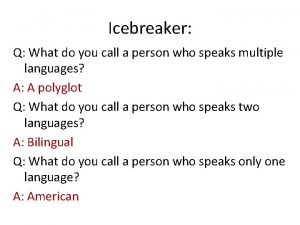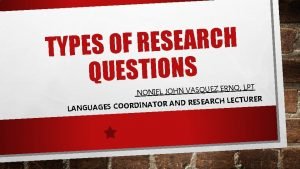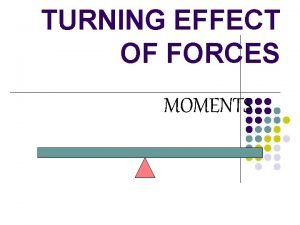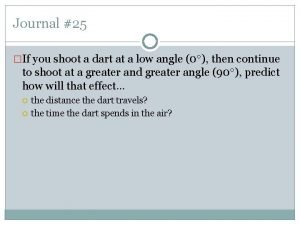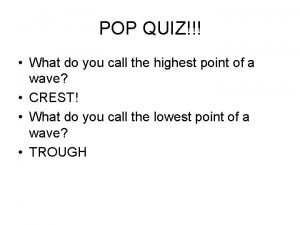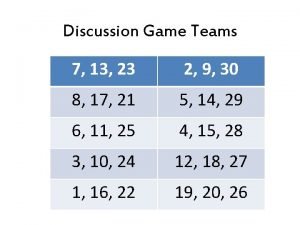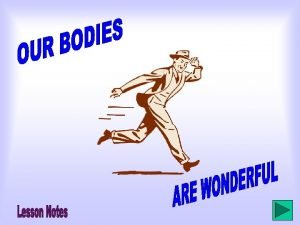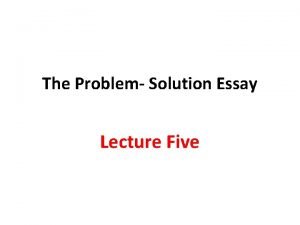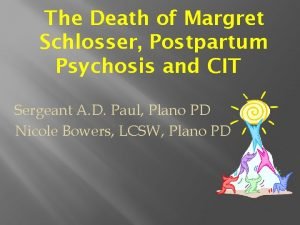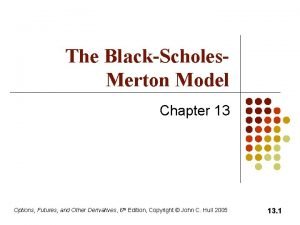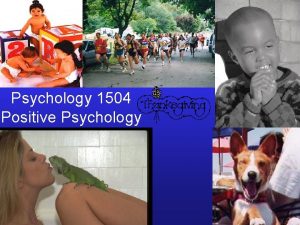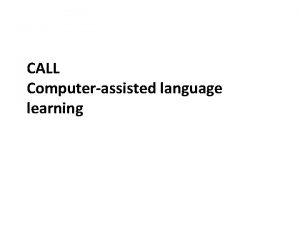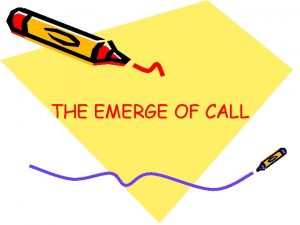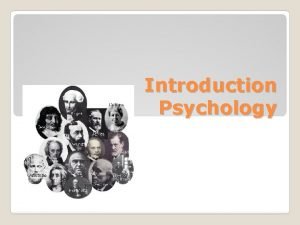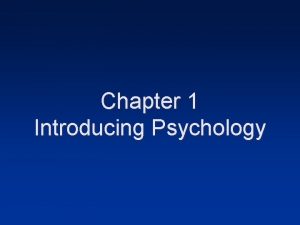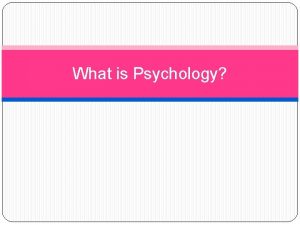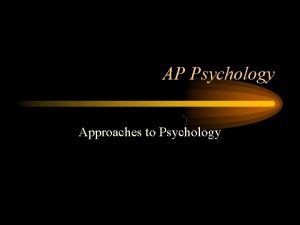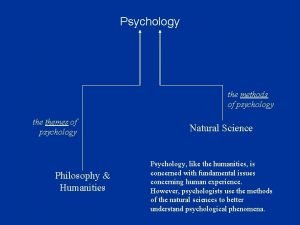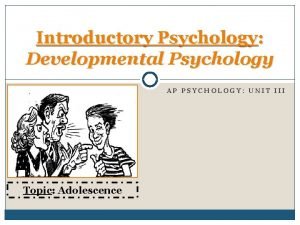WHAT IS PSYCHOLOGY If you call me a





















































- Slides: 53

WHAT IS PSYCHOLOGY If you call me a loser I may feel sad inside. But I will still act tough. (but I will be crying on the inside, so be gentle).

WHAT IS PSYCHOLOGY? • Psychology is the scientific study of behavior and mental processes. • “Psychology” has its roots in the Greek words of “psyche, ” or mind, and “-ology, ” or a field of study. ” • Aristotle initially looked for a relationship between the body and mental state

SCIENTIFIC METHOD • The science of psychology is based on objective, & verifiable evidence obtained using the scientific method. • What is the scientific method? • • Generate a question Formulate a theory Develop a hypothesis (if-then) Test hypothesis • Operational definitions • Clear and concise • Replication of results

THE EMPIRICAL APPROACH • Much like the scientific method, the empirical approach uses: • a set of standards to conduct a study • emphasizes careful observation and scientifically based research. • Why is it important to use the empirical approach? • • • Curiosity: passion to explore and understand Skepticism: questioning results; retesting Humility: understanding humans’ limitations and the possibility for error • Ultimately, psychologists must be critical thinkers • Do not accept “truths” without first testing them • Look at evidence, question assumptions, filter out biases

WHAT IS REAL PSYCHOLOGY AND WHAT IS PSEUDO-PSYCHOLOGY? • Pseudo-psychology is the phony or unscientific psychology which pretends to be the real thing. • Video: Are they real? • https: //www. youtube. com/watch? v=c. FEry 80 s 9 Po

NEGATIVE EFFECTS OF PSEUDOPSYCHOLOGY: • People believe the fake psychology and miss out on real psychological insights which are more helpful and interesting. • E. g. Confirmation bias: Only paying attention to the events and evidence which confirms our desired beliefs. • May produce a lot of fraud. • With increased incidents of fraud in the field of psychology, there is diminished public support for legitimate psychological science.

PSYCHOLOGY VS. PSYCHIATRY • Psychiatry is a specialty in the medical field, not a part of psychology. • Psychiatrists: • hold MDs • have specialized training in the treatment of mental and behavioral problems. • Psychology is a much broader field which has many different specialties.

PSYCHOLOGICAL SUBFIELDS Basic Research – psychologists that study research to create a knowledge base ◦ Ex: biological, developmental, cognitive, personality, and social psychologists Applied Research – apply research gained to tackle practical problems ◦ Ex: industrial/organizational psychologists Counseling psychologists – assists people with problems in living & achieving well-being Clinical Psychologists- studies, assesses, & treats people with psych disorders Psychiatry – branch of medicine, can prescribe medicinal treatments as well as therapy

PSYCHOLOGY’S DIVERSE SUBFIELDS • • • Biological Cognitive Community Developmental Educational Experimental Human Factors Industrial/Organizational Personality Psychometric School Social Human factors

WHEN AND WHERE DID PSYCHOLOGY START? While the Greeks get much of the credit for first identifying ideas about consciousness, other societies were also developing their own ideas. Although both Asian and African cultures had ideas about psychology, it was the Greeks and later the Roman Catholic church which had the most influence on western psychology. There was evidence of trephination (cutting holes into a skull to let evil spirits out) back in the stone age.

MODERN PSYCHOLOGY ROOTED IN HISTORY Developed from several conflicting ideas including: • Structuralism • Functionalism • Gestalt psychology • Behaviorism • Psychoanalysis • Humanism • Evolutionary • Biological • Cognitive • Biopsychosocial

STRUCTURALISM • Wilhelm Wundt (Voont) was the first to declare himself a psychologist. • Considered “founder” or “father” of Psychology • Merged Philosophy & Psychology • 1879 – created first formal lab for research in psych Located @ University of Leipzig Considered psych’s date of birth 1881 – 1 st journal to publish psychology research • He believed in structuralism. Wilhelm Wundt 1832 -1929

STRUCTURALISM Uncovering the basic structures that make up mind and thought-looking for the elements of conscious experience. • Structuralism relies on introspection, or the process of reporting one’s own conscious mental experiences. • Question: • What would be the strengths/weaknesses of introspection?

STANLEY HALL • Studied under Wundt • 1884 – established 1 st research lab @ John Hopkins • 1883 – created first American journal • 1892 – 1 st APA president • APA today • World’s largest org. devoted to advancement of psychology • 155, 000 members

CRITICS OF WUNDT AND STRUCTURALISM • Like most new theories, people began to dispute and refute structuralism. • William James (the first U. S. psychologist) believed that psychology should look at function and not just structure. William James 1842 -1910

FUNCTIONALISM • FUNCTIONALISM- a theory that emphasized the functions of consciousness and the ways consciousness helps people adapt to their environment. • James thought that psychology should explain how people adapted-or failed to adapt-to everyday life outside the laboratory. The parts of the functionalist view of psychology

JAMES’ FUNCTIONALISM James’ criticism of Wundt’s structuralism was that it was boring and inaccurate because it was only done in the laboratory. James wanted to see how people functioned in everyday life, not just in contrived situations. Also he believed that mental process were not static. He described them as a “stream of consciousness. ” Investigate mental testing, patterns of development, effectiveness of education, and behavioral differences in sexes Led to women joining the field

WOMEN IN FIELD Mary Whiton Calkins (1863 -1930) ◦ Studied under James ◦ Was refused the Ph. D. she earned from Harvard because she was female ◦ Founded labs at Wellesley College ◦ Invented widely used tech for studying memory ◦ 1 st APA woman president (1905) Margaret Floy Washburn (1871 -1939) ◦ 1 st Ph. D in Psych for Women ◦ Wrote “The Animal Mind” (1908) Served as beginning of behaviorism Standard reading for generations of psychologists ◦ 2 nd woman APA president

WOMEN IN FIELD Leta Stretter Hollingworth (1886 -1939) ◦ Pioneered work in Adolescent development Mental Retardation Gifted children 1 st to use word “gifted” to describe children who scored exceptionally well on intelligence tests Tried to invalidate certain theories of her time Women are inferior to men Currently, women account for 2/3 rds or more of new psych Ph. D. s earned today Eventually theory of functionalism led to development of behaviorism & applied science

PSYCHOLOGY TODAY • Psychology today arises from several perspectives: • Biological • Evolutionary • Psychoanalysis • Behavioral • Gestalt • Humanistic • Developmental • Cognitive • Sociocultural • Biopsychosocial • Trait views

BIOLOGICAL VIEW: • The biological view looks at how our physical make up and the operation of our brains influence our personality, preferences, behavior patterns, and abilities. • According to biological view, our behavior is a result of heredity, the nervous system and the endocrine system and environmental impacts (insults) such as disease. Question: If you could not remember the names of your parents and went to a psychologist who adheres to the neuroscience perspective, what might they say?

BIOLOGICAL VIEW- NEUROPSYCHOLOGY • Started to gather momentum during the 1950 s and 1960 s • Understanding of how psychological processes relate to the brain’s structures and systems • Notion that cognition and physiology are intricately interrelated and inseparable. • Neuropsychology set itself apart – often with great debate and controversy - from the other brain sciences by usingle-patient empirical studies rather than studies of “groups” of patients.

BIOLOGICAL VIEW- NEUROPSYCHOLOGY • Methodological constraint- case studies can’t be created or replicated in a laboratory. • Complicated and personal nature of brain injuries makes finding a large group of patients with exactly the same symptoms - even from similar brain injuries - nearly impossible. • Subjects in neuropsychological studies are individuals with brain injuries resulting from war, accidents, or conditions such as stroke or Parkinson’s disease. • Some subjects have developmental disorders that prevent normal brain functioning, often interfering with learning or other behaviors.

BIOLOGICAL VIEW CONTINUED • Within the biological view is theory of evolutionary psychology. This theory arises from the ideas of Charles Darwin. • Like Darwin, evolutionary psychologists see behavior and mental processes in terms of their genetic adaptations for survival and reproduction…survival of the fittest.

EVOLUTIONARY PSYCHOLOGY • Focuses on Darwinism. • Evolutionary psychology is based on the arguments of Charles Darwin and his theories of evolution. • We will discuss Darwin in much more detail later on • All species of organisms arise and develop through the natural selection of small, inherited variations that increase the individual's ability to compete, survive, and reproduce.

EVOLUTIONARY PSYCHOLOGY Natural selection is the idea that characteristics of a species evolve in the direction of characteristics that give the fittest organisms a competitive advantage. • Controversial, but valid: While evolutionary psychology is valid, strict evolutionists are controversial saying that even the most destructive behaviors grow out of genetic tendencies. How could this behavior ensure Homer’s ancestors survival?

EVOLUTIONARY/ SOCIO-BIOLOGICAL • This view of psychology looks at individuals’ behaviors through the lens of natural selection. • Behavior is adaptive and hereditary and cultural! • In this theory, genetics are not used a way to show people are different, but rather the ways in which we have evolved.

PSYCHOANALYSIS Psychoanalysis said that mental disorders resulted from conflicts of the unconscious mind. • Freud thought that behavior came from: • Unconscious drives, conflicts and experience that we may not even have a memory of. • Driven by sex and aggression • Importance of early childhood events • Evolved into psychodynamic school Sigmund Freud 1856 -1939

BEHAVIORISM • During this time period (early to mid 1900 s), people started to ignore how you feel inside. • All that mattered was how you acted. • If you they could change your behavior, who cares how you feel. • Very popular during the conservative 1950’s when social appearance mattered more than self expression.

BEHAVIORISM • John B. Watson argued that a true and objective science of psychology should only deal with observable events: • stimuli from the environment and the organism’s response to that stimuli. • These psychologists thought of the mind as a black box which could not be opened or understood. • Since we could not understand it, we should not try to guess what role it has in our actions.

BEHAVIORISM B. F. Skinner (1904 -1990) – responded to softening the behaviorist impact Lead to return to stricter focus on observable behavior Didn’t deny existence to internal mental events Still insisted it couldn’t be scientifically studied No need to study Ex: Food followed by eating response fully describes whether is animal is experiencing hunger Environmental factors mold behavior Organisms tend to repeat responses that lead to positive outcomes Organisms tend not to repeat responses that lead to negative or neutral outcomes

BEHAVIORISM • Ivan Pavlov : Russian physiologist whose research on the physiology of digestion led to the development of the first experimental model of learning, Classical Conditioning. • Most of his research was gathered studying salivating dogs.

BEHAVIORISM (CONT’D) • “Beyond Freedom & Dignity” (1971) • written by Skinner • All behavior is governed by external stimuli • Your actions are not a result of conscious decision • Environment controls people • Free will is an illusion • Met with criticism • Often accused of undemocratic ideals

GESTALT PSYCHOLOGY • Led by Max Wertheimer, Wolfgang Köhler, and Kurt Koffka, focused not on how we feel, but on how we experience the world. • looks at the human mind and behavior as a whole • Gestalt psychology was the opposite of structuralism. Instead of looking at the individual parts, it wanted to examine the whole. • The whole of an experience can be more than the sum of its parts. • Gestalt psychology looked at how the brain works by studying human tendencies in perception and perceptual thinking. • Ex. Recognizing a person’s face.

This may seem like one picture, but it can be perceived as 3 different faces. Can you find them?

GESTALT IMAGES


HUMANISTIC PSYCHOLOGY • 1950’s - Behaviorism & Psychoanalysis were most influential schools in Psychology • Some viewed them as “dehumanizing” • Both criticized them because people were not masters of their own destinies • Both schools didn’t recognize uniquely human behaviors • Humanism forms as a result • Humanism – theoretical orientation that emphasizes unique qualities of humans • Especially freedom/free-will & potential for personal/unique growth • Focuses on the present • Unconditional positive regard • Being genuine • Introspection

HUMANISTIC PSYCHOLOGY Humanism Take optimistic view of human nature Research on animals has little relevance Leaders = Carl Rogers (1902 -1987) & Abraham Maslow (1908 -1970)

HUMANISTIC PSYCHOLOGY Rogers – human behavior governed by individual sense of self, or “self-concept” Both - to full understand people’s behavior, psychology must take into account human drive for personal growth Psych disturbances due to unique human need to reach potential Humanists known for innovative treatments to psychological problems & disorders

HUMANISTIC PSYCHOLOGY • A viewpoint which emphasizes human ability, growth, potential and free will. • Much like the psychoanalytic perspective, it emphasizes our mental thoughts and process as the root of our behavior. • It, however, emphasizes the positive side of human nature. It has received a lot of criticism because it is not the most “scientific. ”

DEVELOPMENTAL VIEW • The developmental view emphasizes changes that occur across our lifespan. • This is the question of nature vs. nurture. What has a bigger impact on us, heredity or environment?

JEAN PIAGET • Theory of cognitive development explains how a child constructs a mental model of the world. • He disagreed with the idea that intelligence was a fixed trait • Regarded cognitive development as a process which occurs due to biological maturation and interaction with the environment.

COGNITIVE VIEW • According to the cognitive view, our actions are a direct result of the way we process information from our environment. • Cognitions are thoughts, expectations, perceptions, memories and states of consciousness. • A Cognitive therapist attempts to change the way you think. What are some of the thoughts John may be having? John meets a girl… He has high hopes. . She rejects him & he doesn’t even get her number.

COGNITIVE VIEW • Cognitive psychologists are a combination of the best of Structuralists, Functionalists and Gestalt traditions and ideas. • Modern cognitive psychologists have also borrowed theories from linguists and believe that our most basic language skills are prewired into our brains from birth. • Language Acquisition Device (LAD) by Noam Chomsky • The innate biological ability of humans to acquire and develop language (construct and understand the syntactical structures of language). • All humans share a mechanism which allows us to comprehend, develop, and use language like no other animal.

LANGUAGE ACQUISITION DEVICE (LAD) • Our capacity for language is the same all over the world in wildly different cultures and environments. • Children quickly learn language and learn in developmental stages that occur at the same age no matter what differing environments they grow up in. • Cognitive psychologists use the LAD theory as evidence to support the concept that language is both a learned and innate capability.

ALBERT ELLIS • Developed Rational Emotive Behavior Therapy (REBT) • Theory that cognitions control our emotions and behaviors; therefore, changing the way we think about things will affect the way we feel and the way we behave. AARON BECK • Pioneer in Cognitive Therapy. • Suggested negative beliefs cause depression. • Cognitive Triad • Negative thoughts of self, world, future

SOCIOCULTURAL VIEW • This view emphasizes the importance of social interaction, social learning and a cultural perspective. • Culture: a complex blend of beliefs, customs, values and traditions developed by a group of people and shared with others in the same environment. • Some cultures kiss each other when greeting, some just bow.

TRAIT VIEW • Trait theory (also called dispositional theory) is an approach to the study of human personality. • Trait theorists are primarily interested in the measurement of traits, which can be defined as habitual patterns of behavior, thought, and emotion. • Accordingly, the view says that behavior results from each person’s unique combination of traits. • Ex. Introversion or extroversion vs. mood swings

BIOPSYCHOSOCIAL APPROACH • Regardless of the particular school of thought, contemporary psychology has come to embrace the biopsychosocial approach • Biological influences of genes, hormones, brain • Psychological influences of emotions, learned information, and cognitions • Social-Cultural influences of other people, culture, family, groups, media

POSITIVE PSYCHOLOGY • Martin Seligman, founder of positive psychology • shifts focus away from the negative and focuses on strengths, well-being, and the pursuit of happiness. • scientific study of the strengths that enable individuals and communities to thrive. • Belief that people want to: • lead meaningful and fulfilling lives • to cultivate what is best within themselves • to enhance their experiences of love, work, and play.

ECLECTIC PERSPECTIVE • No one perspective has all the answers • some are more scientific (behavioral and cognitive • some based more on human behavior • Bits and pieces of several perspectives are used to best fit a particular situation.

VIDEO: RECAP (10. 54 MINS) • http: //www. youtube. com/watch? v=vo 4 p. MVb 0 R 6 M
 Long call short call
Long call short call Option terminology
Option terminology Gartner magic quadrant call recording
Gartner magic quadrant call recording Positive psychology ap psychology definition
Positive psychology ap psychology definition Social traps ap psychology definition
Social traps ap psychology definition Fundamental attribution error ap psychology
Fundamental attribution error ap psychology Introspection method in psychology
Introspection method in psychology Social psychology is the scientific study of:
Social psychology is the scientific study of: Health psychology definition ap psychology
Health psychology definition ap psychology What do you call an unemployed jester
What do you call an unemployed jester What happens when you call 999
What happens when you call 999 An activity under consideration is called
An activity under consideration is called What are the three building blocks of geometry
What are the three building blocks of geometry You call me misbeliever, cut-throat dog analysis
You call me misbeliever, cut-throat dog analysis Christmas table quiz seomra ranga
Christmas table quiz seomra ranga What do you call this
What do you call this Situation-relating questions
Situation-relating questions Example of turning force
Example of turning force Palomar eservices
Palomar eservices Well defined set
Well defined set What is the smallest unit of a textile?
What is the smallest unit of a textile? A fiber is the smallest unit of a textile material
A fiber is the smallest unit of a textile material Uw madison student health
Uw madison student health What do you call a castrated male sheep
What do you call a castrated male sheep 1. describe the path taken by the projectile.
1. describe the path taken by the projectile. It is an immediate and temporary care given
It is an immediate and temporary care given What do you call the highest
What do you call the highest Sfu canvs
Sfu canvs Abcdefghijklmnopqstuvwxyz
Abcdefghijklmnopqstuvwxyz Rain
Rain You are what you eat do you agree or disagree
You are what you eat do you agree or disagree If you think you can you can poem
If you think you can you can poem Tell me what you eat and i shall tell you what you are
Tell me what you eat and i shall tell you what you are Wherever you go i will follow
Wherever you go i will follow What comes to your mind when you hear the word work?
What comes to your mind when you hear the word work? Netconf call home
Netconf call home Lamentations 3 22-23 amp
Lamentations 3 22-23 amp Wireless intelligent networking
Wireless intelligent networking What is computer assisted language learning (call)
What is computer assisted language learning (call) Contact center webrtc
Contact center webrtc What is distinguishable permutation meaning
What is distinguishable permutation meaning Asterisk based call center
Asterisk based call center The optional feature in a business letter is the
The optional feature in a business letter is the Auto attendant call flow diagram
Auto attendant call flow diagram Item call number alma
Item call number alma Problem solution essay outline
Problem solution essay outline First call resolution definition
First call resolution definition The road back in finding nemo
The road back in finding nemo Deanna schlosser
Deanna schlosser How to arise and shine
How to arise and shine What is the conflict of the call of the wild
What is the conflict of the call of the wild Black-scholes-merton model
Black-scholes-merton model Debbie's call short story analysis
Debbie's call short story analysis Call center projects
Call center projects
